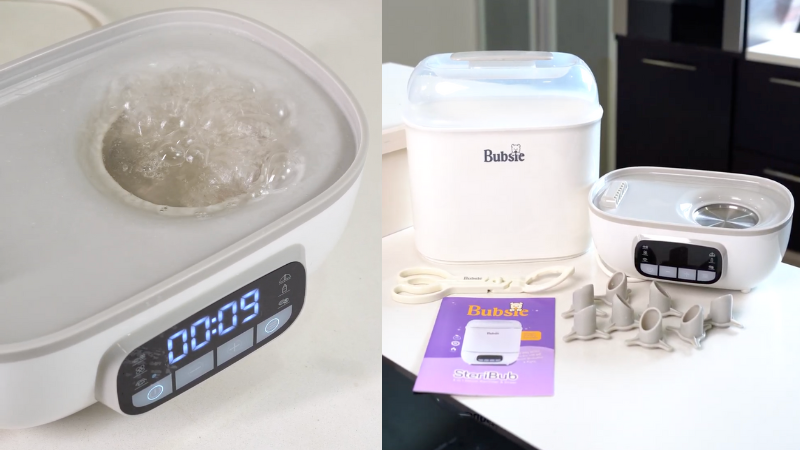
Why Descaling Your Sterilizer is Crucial for Your Baby’s Safety and Appliance Health
Share
As parents, we go above and beyond to make sure our babies are safe, healthy, and comfortable. One of the most trusted tools in this journey is a sterilizer. Whether you use it for baby bottles, nipples, pacifiers, or small feeding accessories, it ensures harmful germs and bacteria are eliminated before they reach your child. But while sterilizers work hard for you every day, they also need a little care in return - specifically, regular descaling.
Many parents overlook this step, thinking a quick rinse is enough. However, ignoring descaling can reduce the efficiency of your sterilizer, shorten its lifespan, and most importantly, compromise the hygiene of your baby’s essentials. Let’s dive into why descaling is so important and how it can make all the difference.
What is Descaling?
Descaling is the process of removing mineral buildup - commonly known as limescale - that accumulates inside the sterilizer over time. This scale is caused by minerals like calcium and magnesium that are naturally present in water, especially hard water.
While these minerals aren’t harmful to humans, they can clog and damage the inner parts of your sterilizer. Imagine trying to breathe through a blocked nose - your sterilizer faces a similar struggle when scale blocks its steam vents and heating elements.
Why Descaling is Crucial
1. Ensures 100% Hygiene
The primary purpose of your sterilizer is to eliminate bacteria. If mineral deposits block the flow of steam, bottles and accessories may not be sterilized thoroughly. That means germs can survive, posing a risk to your baby’s health. Regular descaling keeps the sterilizer functioning at its full capacity so, you can trust every cycle to be effective.
2. Extends the Lifespan of the Appliance
Mineral buildup isn’t just unsightly - it’s damaging. Over time, scale can eat away at heating elements and other key components. A sterilizer that isn’t descaled regularly may fail long before its time. By descaling, you protect your investment and ensure the appliance lasts longer.
3. Saves Energy and Time
A sterilizer clogged with limescale has to work harder to generate the same amount of steam, which means longer sterilization times and higher energy consumption. With regular descaling, the unit runs more efficiently, saving you both time and electricity.
4. Prevents Bad Odors and Residue
Have you ever noticed a strange smell or white residue in your sterilizer? That’s scale buildup. Not only is it unpleasant, but it can also transfer to bottles and accessories, leaving behind a chalky film. Descaling eliminates this issue and keeps everything fresh and clean.
5. Provides Peace of Mind
Parenting already comes with enough worries - you shouldn’t have to second-guess whether your sterilizer is doing its job. A simple descaling routine gives you confidence that your baby’s feeding items are truly clean and safe.
How Often Should You Descale?
It’s recommended to descale your sterilizer once a week if you’re using tap water, especially in areas with hard water. If you use distilled or purified water, you can descale less often, but it’s still important to keep an eye out for signs of buildup.
How to Descale Your Sterilizer
Descaling doesn’t have to be complicated. Here’s a quick and effective method:
- Add 150 ml of clean water and 50 ml of white vinegar (low-concentration acetic acid) to the water tank.
- Run the sterilizer on steam mode for about 5 minutes.
- Turn off the unit and unplug it.
- Pour out the vinegar solution.
- Rinse the water tank and jar several times with clean water to remove any odor.
- Wipe dry with a soft cloth before the next use.
Tip: Before sterilizing baby items after descaling, run one empty steam cycle with fresh water to ensure all vinegar smell is gone.
Your sterilizer is an unsung hero in your baby’s hygiene routine. It works tirelessly to kill germs and bacteria, protecting your child every single day. But like any hardworking appliance, it needs proper care to continue delivering its best performance.
Regular descaling not only keeps your sterilizer in top condition but also ensures every bottle, pacifier, and accessory is truly safe for your baby. Think of it as a small step with a big impact - because when it comes to your child’s health, every detail counts.
So, make descaling a part of your weekly routine. A few minutes of effort will go a long way in keeping both your sterilizer and your baby healthy and happy.
